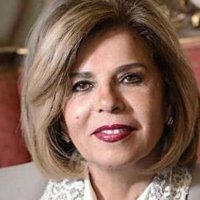The Arab Awakening: Is Democracy a Mirage?
More than a year after the uprisings of the Arab Awakening, the political situation in the Middle East continues to be unstable, and the future of the region is still uncertain. A panel of experts discussed the role of political Islam, the need for constitutional reform, and whether a democratic model of governance can and will be realized in the region.
On June 20, the Middle East Program and the Council of Women World Leaders hosted a meeting on “The Arab Awakening: Is Democracy a Mirage?” with Moushira Khattab, Wilson Center Public Policy Scholar, Former Egyptian Ambassador to South Africa and the Czech and Slovak Republics, and Former Egyptian Minister of Family and Population; Roberto Toscano, President of Intercultura Foundation, Former Italian Ambassador to Iran and India, and Former Wilson Center Public Policy Scholar; Fatima Sbaity-Kassem, Former Director of UN-ESCWA Centre for Women; and Daniel Brumberg, Senior Adviser at USIP’s Center for Conflict Analysis and Prevention, and Co-Director, Democracy and Governance Studies and Associate Professor, Georgetown University. Haleh Esfandiari, Director of the Middle East Program at the Wilson Center, moderated the event.
Esfandiari began the conversation by referencing recent political developments in the region, and posed the following questions: How long will the process of democracy take, how can it be expedited, and what conditions are necessary for it to be effective?
Toscano stated that for democracy to be effective there must be citizenship. Alluding to the recent rise to power of Islamist parties, Toscano said that under the influence of more fundamentalist factions, religion has been identified as a proxy for political identity. As a result, secularism in the region has been perceived as a “foreign” ideology. According to Toscano, in order for democracy in the Middle East to be effective, civil society must work with the state, rather than against it, to achieve legitimacy. Toscano concluded by saying that one “type” of democracy will not work for all societies; instead, the concept must be pluralized and re-imagined depending on the context.
Khattab argued that democracy is neither a mirage nor a destination; rather, it is a process and a culture. She explained that with a country as large and complex as Egypt, its transition to democracy had to be complicated. Despite the initial popularity of the Muslim Brotherhood, Khattab said that political Islam is falling out of favor with the Egyptian people. Khattab concluded on an optimistic note, with hope that Egypt can draft a constitution inspired by that of South Africa. She emphasized that in order for democracy to be effective, the rights of women and children must be political priorities. According to Khattab, Egyptians want social justice, dignity and freedom, with the support of the international community, but without foreign interference.
Sbaity-Kassem stated that there is no perfect model of democracy, and although the future of the region was unclear and unpredictable, she stressed that the gains of the Arab Awakening were irreversible. As a result, the relationships of governments in the region with the West will also change. Sbaity-Kassem said that Islam is no bar to gender equality or democracy, referencing the achievements of many non-Arab, democratic Muslim countries. For democracy to be effective, Sbaity-Kassem said political parties must become democratic, foreign intervention must be at a minimum, and pluralistic societies must be favored. She stressed that it is necessary to be patient, and to understand that the outcomes may not mirror Western-style democracy.
Brumberg echoed the views of the other panelists and said the “wall of fear” was broken. He was optimistic about democracy in the region but stated that it would be a learning process for all. According to Brumberg, the future of governance in the Middle East would not be a renewal of the regimes of the past, as the post-uprising countries have “crossed the threshold.”
By Samaa Ahmed, Middle East Program
Speakers

First Vice Chair of the African Committee of Experts on the Rights and Welfare of the Child; Former Ambassador of Egypt to South Africa and to the Federal Republic of Czechoslovakia; and Former Egyptian Minister of Family and Population
Hosted By

Middle East Program
The Wilson Center’s Middle East Program serves as a crucial resource for the policymaking community and beyond, providing analyses and research that helps inform US foreign policymaking, stimulates public debate, and expands knowledge about issues in the wider Middle East and North Africa (MENA) region. Read more


Global Women's Leadership Initiative
The Global Women’s Leadership Initiative has hosted the Women in Public Service Project at the Wilson Center since June, 2012. The Women in Public Service Project will accelerate global progress towards women’s equal participation in policy and political leadership to create more dynamic and inclusive institutions that leverage the full potential of the world’s population to change the way global solutions are forged. Read more
